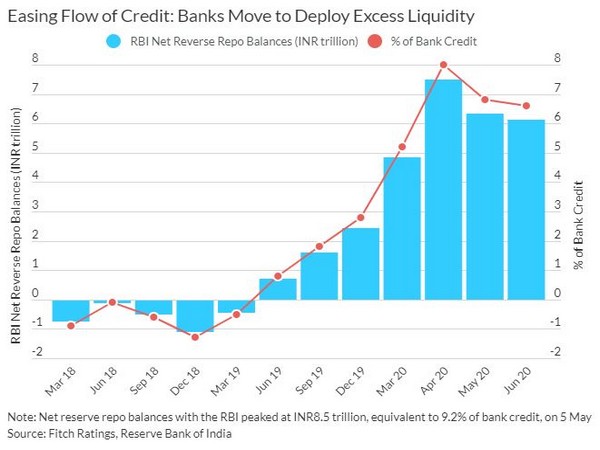India's NBFI liquidity and asset-quality risks remain elevated: Fitch
India's non-bank financial institutions (NBFIs) will continue to face elevated near-term risks even as economic activity picks up with the easing of the country's nationwide lockdown, according to Fitch Ratings.

India's non-bank financial institutions (NBFIs) will continue to face elevated near-term risks even as economic activity picks up with the easing of the country's nationwide lockdown, according to Fitch Ratings. These risks revolve around liquidity and asset quality in particular and reflect the impact of the coronavirus pandemic on borrowers' repayment capabilities as well as the effects of the moratorium on collections, it said.
The cash flow implications of the moratorium, which regulators have extended to end-August, have not been uniform across the industry, affecting some NBFIs liquidity profiles more materially and placing pressure on their ability to repay or refinance upcoming obligations. "We expect near-term inflows to remain below pre-pandemic levels and to improve only gradually as economic activity gathers pace," said Fitch.
The moratorium impact has varied across the different NBFI business models. Among Fitch-rated issuers, IIFL Finance and Shriram Transport Finance Company have had a higher proportion of collections affected by the moratorium than conventional gold lenders like Muthoot Finance and Manappuram. "We believe the moratorium will erode payment discipline and its extension will result in lagged asset-quality problems for NBFIs, particularly when combined with the economic damage from the pandemic and lockdown. We expect India's economy to contract by 5 per cent in the financial year ending March 2021 (FY21)."
Asset quality indicators did not show a significant deterioration in FY20 but regulatory guidance around impaired-asset recognition indicates that the true extent of the damage may only become visible in FY22. This lack of transparency will complicate the sector's fundraising efforts, said Fitch. "The FY20 results do reveal that many of the sector's largest competitors took proactive provisioning, but whether this was sufficient will depend on the extent of asset-quality deterioration in the coming months. We expect credit costs to be elevated over the medium-term."
Interest spreads for NBFIs have narrowed since mid-May and funding conditions have begun to improve. The three-year India AAA NBFI index spread over Indian government securities of the same maturity fell to 174 basis points on June 29 from 270 basis points on May 15. Nevertheless, except for short-term gold-backed loan providers, liquidity remains tight for most business models across the sector.
"We would regard equity raising as credit positive for NBFIs, but expect this to remain difficult in the near-term for all but the most established companies. Among the major NBFIs, Shriram Transport and Mahindra & Mahindra Financial Services have recently announced equity rights issues to be completed in the coming months. (ANI)
(This story has not been edited by Devdiscourse staff and is auto-generated from a syndicated feed.)
ALSO READ
US Defense Secretary affirms commitment to bolster US-India partnership in Indo-Pacific to support allies' efforts.
Border blurs at Zero Point in Jhakuatari on Eid, as locals from India, Bangladesh gather for Namaz
Badminton Asia Championships: PV Sindhu, HS Prannoy ousted, India's campaign ends
"Want every Indian to see that video clip": Jewish woman of Indian-origin recalls losing loved ones to Hamas terrorists on Oct 7
US defence secretary reaffirms commitment to strengthening US-India partnership in supporting allies in Indo-Pacific region










